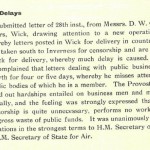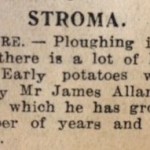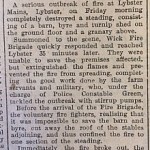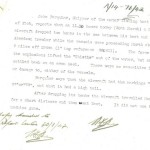This week the Japanese attacked the 24,000 American and Filipino soldiers trapped on the Bataan Peninsula in the Philippines; meanwhile, the Japanese Navy sank the cruisers HMS Cornwall and HMS Dorsetshire off Ceylon [Sri Lanka]. On 4 April Germany decided to stage raids on historic British cities in reprisal for the bombing of Lübeck last week, known as the “Baedeker raids” after the popular tourist guidebook. Over on the Eastern Front the Soviet winter offensives had run their course; Moscow had been saved, but the bulk of the German Army was still intact. On 5 April Hitler issued instructions for a summer offensive in the south to seize the Caucasus oil fields and the distant city of Stalingrad on the Volga.
 Wick Burgh Council this week expressed their frustration with the delays caused by new censorship regulations “whereby letters posted in Wick for delivery in country districts in Caithness are taken south to Inverness for censorship and are thereafter returned to Wick for delivery… The feeling was strongly expressed that the new method of censorship is quite unnecessary, performs no work of public value, and is a gross waste of public funds.”
Wick Burgh Council this week expressed their frustration with the delays caused by new censorship regulations “whereby letters posted in Wick for delivery in country districts in Caithness are taken south to Inverness for censorship and are thereafter returned to Wick for delivery… The feeling was strongly expressed that the new method of censorship is quite unnecessary, performs no work of public value, and is a gross waste of public funds.”

Spring planting was underway across the county. On Stroma, the John O’Groat Journal reported that “Ploughing is now going ahead, but there is a lot of leeway to be made up. Early potatoes were planted last week by Mr James Allan, Greystone.” In other districts the sowing of corn was begun.
 Also in the John O’Groat Journal this week was a report of a fire at Lybster Mains which destroyed a barn, byre and turnip shed with granary above. The fire started when a blow-lamp used to start an engine sprayed paraffin which burst into flame. The alarm was raised but it took the Fire Brigade 35 minutes to get there from Wick. Meanwhile, the farm servants and military under the charge of Police Constable Green of Lybster, “tackled the blaze with stirrup pumps… realising that it was impossible to save the barn and byre [they] cut away the roof of the stables adjoining, and thus contained the fire.” All the stock were saved.
Also in the John O’Groat Journal this week was a report of a fire at Lybster Mains which destroyed a barn, byre and turnip shed with granary above. The fire started when a blow-lamp used to start an engine sprayed paraffin which burst into flame. The alarm was raised but it took the Fire Brigade 35 minutes to get there from Wick. Meanwhile, the farm servants and military under the charge of Police Constable Green of Lybster, “tackled the blaze with stirrup pumps… realising that it was impossible to save the barn and byre [they] cut away the roof of the stables adjoining, and thus contained the fire.” All the stock were saved.

The John O’Groat Journal reported that Weydale School water supply had recently been tested, and the results weren’t good. The tests showed “pollution of the water supply by sewage, and that the water was of bad quality and quite unfit for public use.” The School Management Committee resolved to draw up a specification “to rectify the matter”.
 Finally this week, John Farquhar, skipper of the motor fishing boat “Thistle”, had a narrow escape when “a German aircraft dropped two bombs in the sea between his boat and an Aberdeen trawler” about two miles north of Bruan. “The force of the explosions lifted the “Thistle” out of the water, but she settled back on an even keel.” Fortunately neither vessel was damaged, nor were there any casualties. “After dropping its bombs the aircraft travelled north a short distance and then went east. It did not use its machine guns.”
Finally this week, John Farquhar, skipper of the motor fishing boat “Thistle”, had a narrow escape when “a German aircraft dropped two bombs in the sea between his boat and an Aberdeen trawler” about two miles north of Bruan. “The force of the explosions lifted the “Thistle” out of the water, but she settled back on an even keel.” Fortunately neither vessel was damaged, nor were there any casualties. “After dropping its bombs the aircraft travelled north a short distance and then went east. It did not use its machine guns.”
